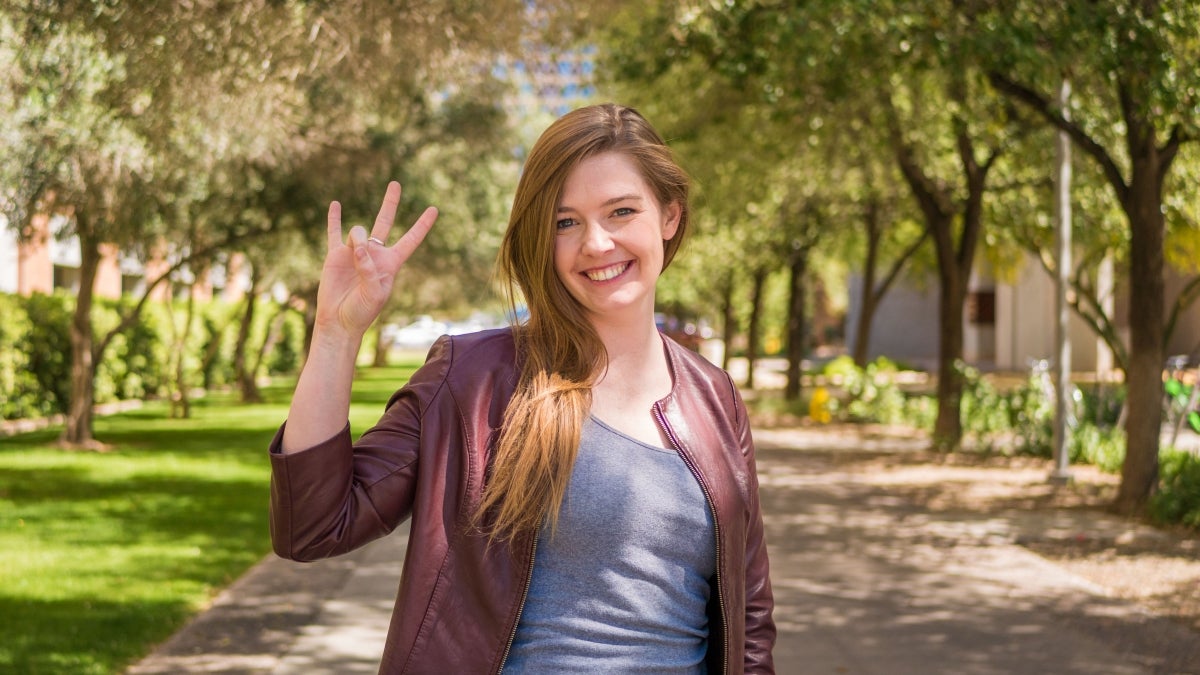ASU psychology graduate student studies the emotions of parenting

Makenzie O’Neil, a doctoral student in the Arizona State University Department of Psychology, studies the emotions associated with the parent-child caregiving relationship.
Parenting is challenging and important, and it doesn't come with an instruction manual.
Sometimes, parents have to figure out situations that are unfamiliar or that they might not understand. Such situations can be stressful, and stress can be detrimental to the long-term health of both parent and child.
Makenzie O’Neil, a doctoral student in the Arizona State University Department of Psychology, studies the emotions associated with the parent-child caregiving relationship. Her focus is on the emotions of parents in different child-focused situations, such as when one’s child is being particularly cute and clumsy as compared to when one’s child is presented with an external physical threat.
“Studying the emotions associated with parenting will provide greater understanding about the prevalence of certain parenting behaviors like playing with or protecting one’s child,” O’Neil said.
O’Neil works with Michelle Shiota, associate professor of psychology and the director of the Shiota Psychophysiology Laboratory for Affective Testing (SPLAT) lab. The SPLAT lab studies the nature and implications of human emotions by using combinations of physiological, behavioral, cognitive and qualitative measures like narratives and questionnaires.
“Makenzie is feisty and an independent thinker,” Shiota said. “She knows what she wants to accomplish with her teaching and research. I respect her commitment enormously.”
Understanding and helping others
O’Neil is also interested in prosocial behaviors, which are helping behaviors like giving to others in need. She is especially interested in studying prosocial behaviors toward so-called outgroups, or groups of people different from you, like the distinction between New York Yankees and Boston Red Sox fans. O’Neil’s research seeks to find solutions to the tendency of people to dislike, compete with and be aggressive against outgroups.
“Prosocial behavior tends to lead to a suite of positive outcomes including feeling more positively about someone who helps you and wanting to reciprocate, or wanting to ‘pay-it forward’,” O’Neil said. “These behaviors can also leave you feeling happier when you help someone else and to more cooperative interactions with someone who has helped you.”
The interactions within social groups and close interpersonal relationships are treated as distinct areas of psychological research, but O’Neil’s work brings them together.
“Makenzie's research is innovative and applies an evolutionary perspective to the experience, expression, and social consequences of positive emotions. Her work comes from a genuine concern with understanding, and ultimately amplifying, the mechanisms of human nature that foster positive relationships of all kinds,” Shiota said.
ASU Now spoke with O'Neil about her life in and out of the lab.
Question: What brought you to ASU psychology?
Answer: The research is so fascinating and complements my interests well. When I came out to interview, I just felt comfortable and welcomed by everyone in the program, and that was very important to me.
Q: What would you like to study in the future?
A: I plan to continue learning about caregiving emotions and prosociality. The biggest problem I've had lately is that I have so many interesting and unanswered questions related to my dissertation research that I have trouble knowing which ones to tackle first.
Q: What are your career goals?
A: I would like to be a professor at a small liberal arts school. I absolutely love teaching and mentoring undergraduate students, and I really appreciate the low student-to-faculty ratio that exists at smaller schools.
Q: What are your hobbies?
A: Anything outdoors! Hiking, backpacking, and rock climbing are some of my favorites, unless it's June, July or August. Then you can find me in the A/C or by any body of water!
More Science and technology

Indigenous geneticists build unprecedented research community at ASU
When Krystal Tsosie (Diné) was an undergraduate at Arizona State University, there were no Indigenous faculty she could look to…

Pioneering professor of cultural evolution pens essays for leading academic journals
When Robert Boyd wrote his 1985 book “Culture and the Evolutionary Process,” cultural evolution was not considered a true…

Lucy's lasting legacy: Donald Johanson reflects on the discovery of a lifetime
Fifty years ago, in the dusty hills of Hadar, Ethiopia, a young paleoanthropologist, Donald Johanson, discovered what would…